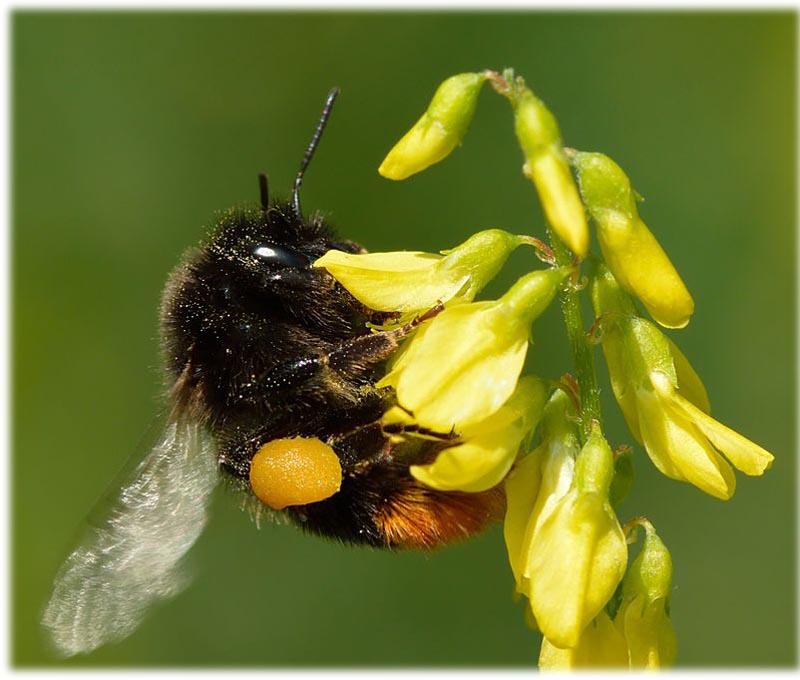 Bumblebees
Bumblebees
Study finds Bumblebees learn new 'trends' in their behaviour by watching and learning
London: The research, led by Queen Mary University of London and published in PLOS Biology, provides strong evidence that social learning drives the spread of bumblebee behaviour – in this case, precisely how they forage for food.
A variety of experiments were set up to establish this.
The researchers designed a two-option puzzle box that could be opened either by pushing a red tab clockwise or a blue tab counter-clockwise to reveal a 50 per cent sucrose solution reward.
‘Demonstrator’ bees were trained to use either the red or blue tabs, with ‘observer’ bees watching. When it was the observers’ turn to tackle the puzzle, they overwhelmingly and repeatedly chose to use the same method that they had seen, even after discovering the alternative option.
This preference for the taught option was maintained by whole colonies of bees, with a mean of 98.6% of box openings made using the taught method.
The importance of social learning to the acquisition of puzzle box solutions was also illustrated through the control group, which lacked a demonstrator.
In this group, some bees managed to open the puzzle boxes, but did so far fewer times than those who benefitted from seeing another bee do it first.
The median number of boxes opened in a day by the observer bees with a demonstrator was 28 boxes a day, whereas it was only 1 for the control colony.
In an additional experiment, the researchers put both ‘blue’ and ‘red’ demonstrators into the same populations of bees. In the first population, 97.3% of the 263 incidences of box-opening by observers by day 12 used the red method. In the second population, observers preferred the blue method over the red on all days except one.
In both cases, this demonstrated how a behavioural trend might emerge in a population in the first place – for the most part, due to experienced bees retiring from foraging and new learners arising, rather than any bees changing their preferred behaviour.
Similar results from similar experiments have been used in species such as primates and birds to suggest that they, like humans, are capable of culture.
If bumblebees are capable of this, too, this could potentially explain the evolutionary origin of many of the complex behaviours seen among social insects. It might be possible that what now appears instinctive could have been socially learnt, at least originally.
Dr Alice Bridges, the lead author from Queen Mary University of London, said: “Bumblebees – and, indeed, invertebrates in general - aren’t known to show culture-like phenomena in the wild. However, in our experiments, we saw the spread and maintenance of a behavioural “trend” in groups of bumblebees – similar to what has been seen in primates and birds. The behavioural repertoires of social insects like these bumblebees are some of the most intricate on the planet, yet most of this is still thought to be instinctive. Our research suggests that social learning may have had a greater influence on the evolution of this behaviour than previously imagined.”
Professor Lars Chittka, Professor of Sensory and Behavioural Ecology at Queen Mary University of London and author of the book ‘The Mind of a Bee’, said: “The fact that bees can watch and learn, and then make a habit of that behaviour, adds to the ever-growing body of evidence that they are far smarter creatures than a lot of people give them credit for.
“We tend to overlook the “alien civilisations” formed by bees, ants and wasps on our planet – because they are small-bodied and their societies and architectural constructions seem governed by instinct at first glance. Our research shows, however, that new innovations can spread like social media memes through insect colonies, indicating that they can respond to wholly new environmental challenges much faster than by evolutionary changes, which would take many generations to manifest.”
Support Our Journalism
We cannot do without you.. your contribution supports unbiased journalism
IBNS is not driven by any ism- not wokeism, not racism, not skewed secularism, not hyper right-wing or left liberal ideals, nor by any hardline religious beliefs or hyper nationalism. We want to serve you good old objective news, as they are. We do not judge or preach. We let people decide for themselves. We only try to present factual and well-sourced news.







